
Exposé Online
What's old
Exposé print issues (1993-2011)
- 1 (October 1993)
- 2 (February 1994)
- 3 (May 1994)
- 4 (August 1994)
- 5 (October 1994)
- 6 (March 1995)
- 7 (July 1995)
- 8 (November 1995)
- 9 (March 1996)
- 10 (August 1996)
- 11 (February 1997)
- 12 (May 1997)
- 13 (October 1997)
- 14 (February 1998)
- 15 (July 1998)
- 16 (January 1999)
- 17 (April 1999)
- 18 (November 1999)
- 19 (May 2000)
- 20 (October 2000)
- 21 (March 2001)
- 22 (July 2001)
- 23 (December 2001)
- 24 (April 2002)
- 25 (September 2002)
- 26 (February 2003)
- 27 (August 2003)
- 28 (December 2003)
- 29 (April 2004)
- 30 (September 2004)
- 31 (March 2005)
- 32 (September 2005)
- 33 (May 2006)
- 34 (March 2007)
- 35 (January 2008)
- 36 (October 2008)
- 37 (July 2009)
- 38 (July 2010)
- 39 (Summer 2011)
Features
How to Make It in Progressive Rock —
The Nick Barrett Interview

As an observer of the progressive rock scene, one of the nicest surprises in recent years has been the success of veteran British band Pendragon. They've always enjoyed a strong fan base and their albums have consistently sold well, though during the late 1990s I heard about them less and less until I began to think that the next news about them would be their obituary. I mean, how could a band forged in the same neo-prog fires as Marillion and Twelfth Night, and known for a sound that borrowed from 70s Genesis and Camel be able to remain relevant in a prog landscape dominated by the likes of Porcupine Tree and Dream Theater? The answer boils down to one man: Nick Barrett.
by Paul Hightower, Published 2013-05-05
photography by Neil Palfreyman, Willem Klopper
I.
Nick Barrett, Pendragon's singer, guitar player and band leader since its founding in 1978, has demonstrated that you can teach an old dog new tricks and that sometimes the formula needs to be thrown out the proverbial window. But more than that, he proved that — as in just about any endeavor — success comes down to hard work and belief in one's self.

Barrett has always had a stubborn streak. "I'm known for being persistent and belligerent," he admits, "but I've always planted the seed to keep things going." Perhaps as a sign of maturity he is almost philosophical about the path that has led to where he is today. "You always have choices," he says, when asked to offer advice to young musicians just starting out. "When you feel like you're stuck, you're never stuck. It may look like you're in a black hole, but you've got
to seize chances. I guess my attitude is 'When things feel as bad as they can possibly be, you're on the verge of a breakthrough!'"
He also likes to tell the story of when things were once looking particularly grim and he and Pendragon keyboard player Clive Nolan met up at a nearby café to discuss whether or not they should continue. In the end, he says, they decided to carry on, "just to spite the music press."
In Barrett one finds two characteristically English traits: a stoic attitude toward adversity combined with a bulldog's tenacity.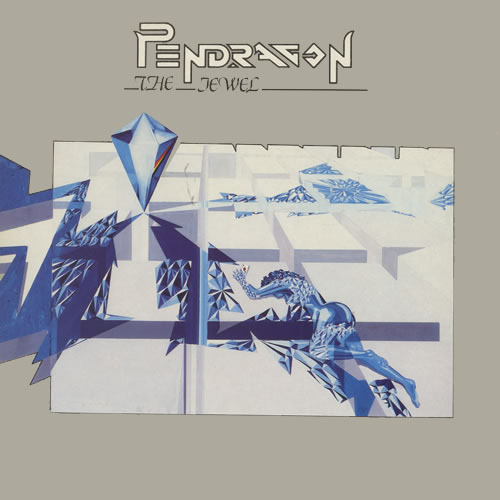 In the early days Barrett and Pendragon seemed to live a charmed life. After crawling out of the sleepy west-country town of Stroud (the band's original name — Zeus Pendragon — was altered because it was too long to fit on a t-shirt, Barrett admits) they eventually caught the attention of Marillion's management who gave the band a prized opening slot on their early tours.This led to a residency at The Marquee club, BBC tapings, and in 1985 the debut album, The Jewel, was released on John Arneson's (Marillion’s manager) Awareness label, distributed by EMI.
In the early days Barrett and Pendragon seemed to live a charmed life. After crawling out of the sleepy west-country town of Stroud (the band's original name — Zeus Pendragon — was altered because it was too long to fit on a t-shirt, Barrett admits) they eventually caught the attention of Marillion's management who gave the band a prized opening slot on their early tours.This led to a residency at The Marquee club, BBC tapings, and in 1985 the debut album, The Jewel, was released on John Arneson's (Marillion’s manager) Awareness label, distributed by EMI.
Did the band hitch their horse too closely to Marillion and EMI? Perhaps, since the same pressure that led to that band hitting rocky waters in the late 80s also affected Pendragon. An admittedly ill-concieved attempt at garnering commercial success, 1988's Kowtow, killed off label interest just as Pendragon were becoming more widely known. "Following Kowtow nobody was interested in signing Pendragon," Barrett says. "The albums were doing OK and getting good reviews, but no money was coming in. But the way I saw it there was no choice but to continue."
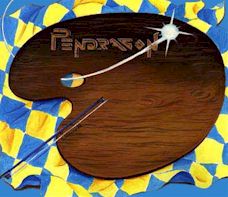 After EMI decided to let Pendragon go, Barrett wasted no time in negotiating the rights to their recordings. "I went to London and met with EMI's A&R man who — funnily enough — is named Norman Bates! Back then the A&R department was easier to deal with than Strategic Marketing, who were more interested in gaining a catalog for reissues or compilations. The way I figured it, going to EMI when the band looked like they were about to fold made us seem less risky. The underdog position paid off for us," he says.
After EMI decided to let Pendragon go, Barrett wasted no time in negotiating the rights to their recordings. "I went to London and met with EMI's A&R man who — funnily enough — is named Norman Bates! Back then the A&R department was easier to deal with than Strategic Marketing, who were more interested in gaining a catalog for reissues or compilations. The way I figured it, going to EMI when the band looked like they were about to fold made us seem less risky. The underdog position paid off for us," he says.
With a licensing agreement in hand, Barrett launched Toff Records. "I started with a bank loan of £3,000," he says. "I had no business background, but learned fast." He admits an entrepreneurial spirit is needed to start your own label, but help also arrived in the guise of the first of several shocks to the music industry that Barrett would be witness to over the years.
II.
As a format for distributing recorded music, the compact disc had been around for several years before Nick Barrett started Toff Records. But this small plastic platter is what Barrett credits with helping launch the label as an independent business. "The CD had many advantages for us over vinyl albums," he explains. "First of all it was inexpensive to manufacture and distribute. Plus, you can produce records in relatively small quantities. The quality was good — as opposed to tapes — and there’s no storage, damaged goods, or leftovers to worry about."
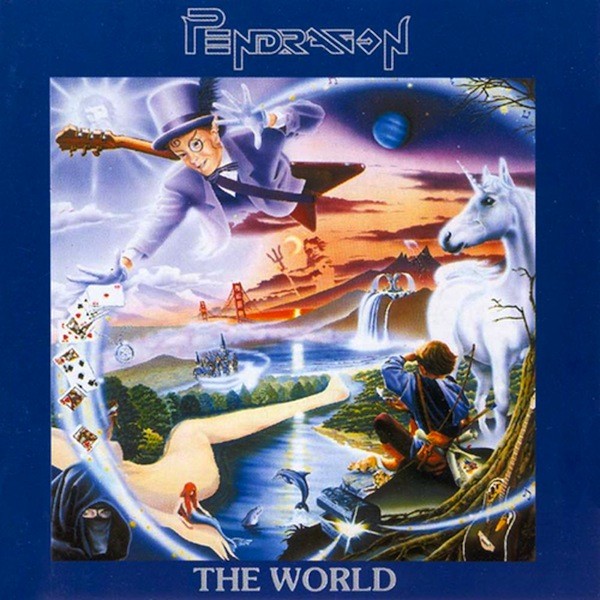 With no outside pressures, Pendragon — now solidified around the lineup of Barrett, Nolan, co-founding bassist Peter Gee, and drummer Fudge Smith — went into the studio and emerged with the album that announced their re-birth, 1991's The World. "I think that album and the next several that followed it solidified the band's style. Not just the music, but the visual direction as well," Barrett says.
With no outside pressures, Pendragon — now solidified around the lineup of Barrett, Nolan, co-founding bassist Peter Gee, and drummer Fudge Smith — went into the studio and emerged with the album that announced their re-birth, 1991's The World. "I think that album and the next several that followed it solidified the band's style. Not just the music, but the visual direction as well," Barrett says.
During this period Barrett also consolidated control over the group as chief songwriter and bandleader. "The 80s were confused, styles were too varied," he admits. "The material was unsure. The 90s by contrast offered an obvious path of cohesive albums with similar themes and sound. Even similar artwork."
Barrett agrees that the band works best with creative control in his hands. "Clive — who I've known since we were four years old, by the way — originally joined as a session player in 1986 (replacing keyboard player Rick Carter) so he's used to taking direction, I suppose. Plus he has a lot of other things going on. The same with Peter."
 During the 90s Pendragon continued to tour, including treks to Los Angeles to play Progfest '95. "You play in far-flung countries because of the excitement," Barrett explains. "Investment is needed, but it pays off."
During the 90s Pendragon continued to tour, including treks to Los Angeles to play Progfest '95. "You play in far-flung countries because of the excitement," Barrett explains. "Investment is needed, but it pays off."
Success during the 90s also allowed the band to pay off debts, and their melodic prog style continued to attract new fans, even if it seemed a bit out of step with the new crop of bands then appearing on the scene. Barrett remained un-fazed: "It seemed like these new bands got attention more because they were using a Mellotron than for their music," he observes.
Still, even by the turn of the century Barrett himself sensed he needed to re-think where the band was heading. The new direction came from an unlikely source of inspiration. "By 2002, 2003 I felt a need to change," he says. "I started listening to new metal bands like Rammstein, and also people like Foo Fighters. But I suppose the moment was when I was watching a motocross DVD with my son and heard Lost Prophets and Trapt. I really liked the aggression and newness. That energy inspired me."
When asked if he was concerned about the fan reaction, he shrugs it off. "My philosophy is, if you don’t like what you're hearing go out and do it yourself," he says. "That's what I did. I was listening to The Lamb Lies down on Broadway and it inspired me to do my own thing. And I hope others will be inspired themselves in the same way."
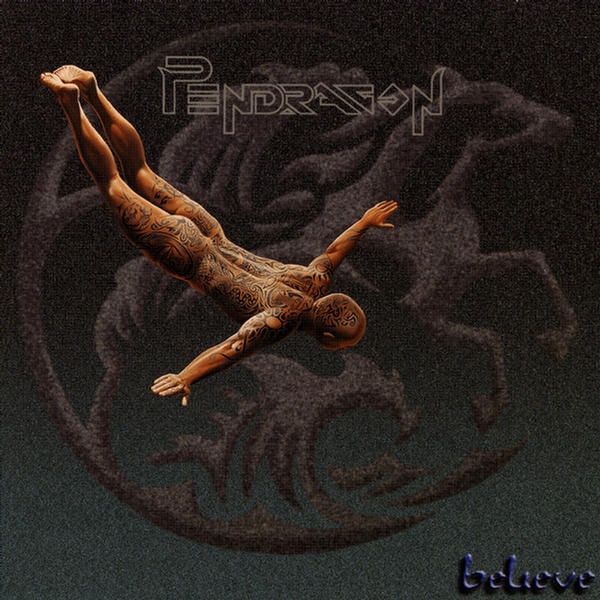 Out of this inspiration came the first album in what Barrett refers to as Pendragon's "Five-year plan," 2005's Believe. He explains, "Five years ago the band was struggling a bit. I'd had a break from the whole thing for a while, and to really come back to it was quite difficult. The five-year plan was to release three albums, do as many DVDs as we could, and play as many shows as we could."
Out of this inspiration came the first album in what Barrett refers to as Pendragon's "Five-year plan," 2005's Believe. He explains, "Five years ago the band was struggling a bit. I'd had a break from the whole thing for a while, and to really come back to it was quite difficult. The five-year plan was to release three albums, do as many DVDs as we could, and play as many shows as we could."
"But it's a slow process over two years, making an album. You have to have patience to get through the difficult periods. The same emotions have no new ways of dealing with them. Disappointment is a killer. Getting to Believe was a mountain."
Believe and its following records, Pure and Passion, are noticeably harder and darker than the band's 90s output. But their success validates Barrett's decision to change direction, and confirmed this was the creative direction he was looking for.
 As it turns out, it seemed to be the direction fans in Europe were also waiting for. This is no better seen than in Poland, where Pendragon's new sound has been especially well received. Barrett attributes it to timing. "The bands that managed to get to Europe in the mid 80s, if they worked hard and got a following in Holland or Germany, but also went to Italy, Spain and Poland have been more successful." He doesn't see the same potential for newer bands, however. "For bands coming along now it's too late," he says. "It's not as exciting for these audiences as seeing the 3rd or 4th wave bands. The newer bands still have to build a following."
As it turns out, it seemed to be the direction fans in Europe were also waiting for. This is no better seen than in Poland, where Pendragon's new sound has been especially well received. Barrett attributes it to timing. "The bands that managed to get to Europe in the mid 80s, if they worked hard and got a following in Holland or Germany, but also went to Italy, Spain and Poland have been more successful." He doesn't see the same potential for newer bands, however. "For bands coming along now it's too late," he says. "It's not as exciting for these audiences as seeing the 3rd or 4th wave bands. The newer bands still have to build a following."
He explains why Poland is such a good market. "By '93 they'd had the albums and were getting played on radio stations with massive saturation. Plus there was still a slightly communist mentality. Producers and DJs were not controlled by corporate direction." One such DJ, Piotr Kaslowski, was playing Western albums on radio station Warsaw 3. This gave the band a crucial opening before others could flood the market.
"We played Poland the first time in '94," Barrett explains. "Our album was voted second best album of the year. The fans were trading the music on home made cassette tapes. They made their own t-shirts!"
But even with new audiences spreading the word, Barrett and company kept working hard and playing shows wherever they could. For example, they once drove all the way to Portugal just to open one show for Dream Theatre. "The last album, Passion, we did a 35-day tour and played as many shows as we could. We have really kept the live thing going," he explains. "It's big tours around an album and we'll play a lot of festivals, and a lot of shows for the next few years around that."
 When Pendragon hits the road they keep the operation lean and mobile. "We get a tour bus that's got quite a big luggage hold so we can get all our back line gear in. You can't always do that. Some coaches don't have much room in the luggage hold and then you have to take a trailer, which can limit your speed. So if on Friday night you're playing Paris and Saturday night you're traveling to Barcelona, you're in a lot of trouble if you've got a trailer on the back because you ain't gonna make it!"
When Pendragon hits the road they keep the operation lean and mobile. "We get a tour bus that's got quite a big luggage hold so we can get all our back line gear in. You can't always do that. Some coaches don't have much room in the luggage hold and then you have to take a trailer, which can limit your speed. So if on Friday night you're playing Paris and Saturday night you're traveling to Barcelona, you're in a lot of trouble if you've got a trailer on the back because you ain't gonna make it!"
The team of a dozen musicians and crew crisscross Europe, playing as often as possible. "We did one convention one weekend in the UK, followed by another convention in Holland on the following weekend. And a week after that we went out and did 30-odd shows in Europe, and then came back and week after that did five shows in the UK. We started in the middle of March and finished in June."
Despite all the touring, there are parts of the world that are hard for Pendragon to reach. While the band have played overseas, it's not easy. "If we could do a tour of America we'd do it in a shot," Barrett says. "But let's just say you wanted us to play in Austin, Texas. The first thing you're going to say is, 'Hey, how many fans we got there?' We've had maybe three people write to us. That's going to cost, what? At least 10-15 thousand dollars. Just do the math — you can see it's insane. You could not book a 50-day tour of America on that basis. Of course you're going to get the west coast, the east coast, and we've played ROSfest and Progfest, but it's filling out the ones in the middle and elsewhere. You've got some great fans, but not enough to really make it into a tour."
Despite the geographical challenges, all that live work can pay off. But sometimes it doesn't. "It depends," Barrett says. "The deals we usually strike are guarantees so they're paying you a fixed fee plus a percentage. So if you get more people than you thought then you're on a bonus. But the last tour we lost £3,000 (approx. $4,700). That's not a massive amount to lose because you make a lot on merchandise, but it's still not good to lose that. The reason why is because the last few tours we brought over some German crew. We brought over a German lighting engineer and a German sound engineer, and they cost a little bit more. But that's part of the investment in the show," he continues. "Hopefully people go away and say, 'Wow, that was the best show I've seen them do.'"
 To help defray potential losses Barrett is always looking for deals, whether they be short or long term. He described the recent licensing deal with Snapper Music: "It's a very short term deal for the last album, 'cause I just wanted a break from manufacturing. We get royalties for the albums, but it's less than what you would get if you were doing it yourself. But then again, you've got a little bit of free time. More time to do some music and just take a bit of a break from running a record company. But it's a short-term deal so we get all our licenses back in a couple years and we'll be free to put them out on our own label. In that way we'll get publishing royalties — or I will 'cause I'm the writer — and we'll also get artist's royalties for our records sold as well."
To help defray potential losses Barrett is always looking for deals, whether they be short or long term. He described the recent licensing deal with Snapper Music: "It's a very short term deal for the last album, 'cause I just wanted a break from manufacturing. We get royalties for the albums, but it's less than what you would get if you were doing it yourself. But then again, you've got a little bit of free time. More time to do some music and just take a bit of a break from running a record company. But it's a short-term deal so we get all our licenses back in a couple years and we'll be free to put them out on our own label. In that way we'll get publishing royalties — or I will 'cause I'm the writer — and we'll also get artist's royalties for our records sold as well."
Despite collaborations like the Snapper Music deal, Barrett is very much a DIY artist. This not only gives him control and a better financial position, it also allows him to move more quickly than some of his peers who might spend months waiting for a good deal. The recent Chris Squire/Steve Hackett collaboration comes to mind. "Yeah, Hackett," he laughs. "I mean, he's no spring chicken! I can't exactly see him out in the shed boxing up thousands and thousands of CDs, you know? These guys, I think they want licensing deals, and they're far and few between. The one we got with Snapper was good, but there's not a lot of those kicking around. Those first generation guys, they don't want to be out there with the tape gun, taping up boxes and phoning up freight companies. It’s a big hassle!"
III.
Despite the time and effort around touring, Pendragon — like most bands — follows the typical cycle that starts with a new album, these days largely recorded at Barrett's home. "I don’t actually have a home studio," he confesses. "I have a room in the middle of the house. These days, you don't really need a great big studio anymore. Crikey, if you've got ProTools you have a hundred tracks of digital recording right there, in the size of an iMac computer. A couple of microphones and away you go."
He laughs at the atmosphere that can surround a home recording session. "I've had it before where I've been at the pinnacle of the most emotional guitar solo, and the kids come home from school and just fire past me! I think it's part of the spirit of recording. I sort of like recording something and then shouting through to the kitchen, 'Put a kettle on!'"
For drum recording and final mixing the action shifts to Karl Groom's Thin Ice studio. Besides his work for Pendragon, Groom is a long time collaborator with keyboard player Clive Nolan on his various projects, so a close community atmosphere presides at the sessions. This also ensures a high quality final product while keeping the overall production costs as low as possible. "Karl gives us a pretty good deal 'cause we've worked with him for so long," Barrett explains. "We figure out a lump sum and we pay him that. It's kind of irrespective of how long that will take. He knows us, we know him. He knows we want to finish within a certain time frame. We're not one of those bands who want to mix something for six months and then decide we want to change it."
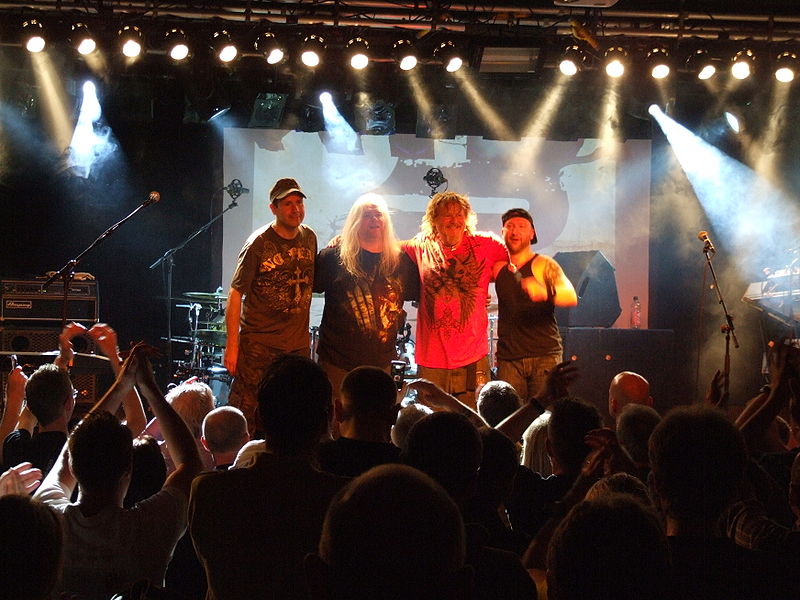 As an independent artist and label owner, keeping the recoding costs down is paramount for Nick Barrett. "Making an album now is a hell of a lot cheaper than it used to be," he admits. "Which is great news because you can spend more time getting the sounds you want. It used to be a bit of a nightmare to go into a studio and spend all that money and not get the sounds you want, because you're up against time." When pressed on the actual costs Barrett puts the figure at "about £10,000. This is not including artwork, the pressing of the CD or any marketing. That would just get me from here to a finished master CD."
As an independent artist and label owner, keeping the recoding costs down is paramount for Nick Barrett. "Making an album now is a hell of a lot cheaper than it used to be," he admits. "Which is great news because you can spend more time getting the sounds you want. It used to be a bit of a nightmare to go into a studio and spend all that money and not get the sounds you want, because you're up against time." When pressed on the actual costs Barrett puts the figure at "about £10,000. This is not including artwork, the pressing of the CD or any marketing. That would just get me from here to a finished master CD."
And as for the musicians? As a member of the original Pendragon lineup, bassist Peter Gee signed a contract with Barrett years ago that pays him a royalty for recordings and a percentage of the profit from live performances. However, Nolan and drummer Scott Higham are paid a fee for both their studio and live work. This means Barrett and Gee stand to gain if tours go well, but also that they split any losses if they don't.
IV.
Reaching fans has always been a part of being in a band. Pendragon was one of the first progressive bands to get a web site, though before that communications were strictly old school. "Letter, word of mouth, that was pretty much it," Barrett explains. "Or fanzines. We'd get a lot of people writing in, from all over the world. Thousands of them in the early 80s. And then it all started to tail off once the web kicked in."
"We used to have a fan club called 'The Mob,'" he continues. "We built up a tremendous amount of new fans with that. For a fairly cheap fee — I think it was about ten dollars — they used to get four magazines per year, and they used to get a free CD or something like that. Sometimes they would even get a video when we had some videos. We had well over a couple thousand people in the fan club. And then we'd make the CDs and the surplus we would sell so that would cover the costs of doing the fan club."
By the late 90s Pendragon's web site was up and running, maintained by a fan based in France. "The guy who used to run it was very up to date with all that technology as it was starting to come along," Barrett says.
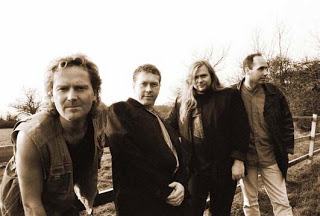 Sales from the web site — e-commerce — came later, around 2006. And newer innovations such as social media have been fully integrated into the band's current communications strategy. "We used to have the MySpace thing — we don't do that anymore," Barrett says. "We used to have a forum, we don't use that anymore either because these things just haven't been all that popular over the past few years. But now Facebook is popular and we're using that all the time for most things. Or just the web site."
Sales from the web site — e-commerce — came later, around 2006. And newer innovations such as social media have been fully integrated into the band's current communications strategy. "We used to have the MySpace thing — we don't do that anymore," Barrett says. "We used to have a forum, we don't use that anymore either because these things just haven't been all that popular over the past few years. But now Facebook is popular and we're using that all the time for most things. Or just the web site."
Barrett admits social media has been a beneficial tool. "It's worked incredibly well," he says. "It is the communication hub of everything we do. It's quite strange to think of how we got by without it before, but it's a bit like cars I suppose. With YouTube and things like that... it's a great thing to see people can get hold of your music very easily. That's really worked well for us."
Part of what makes social media work for Barrett is the flexibility and low time commitment. "I dip in and out of it. I think you can bore the pants off people just keeping a blog going every day for years and years on end... pages and pages of drivel. I think it's OK if you're in a band if you do things in a cyclic fashion. If you're bringing out an album and you're doing a tour, then yeah — do some stuff on your blog, even if all you want to talk about is your holiday, your motorbike, or whatever. But I don't think it's a big deal to back out of it every so often."
V.
At the same time that the Believe album threatened to alienate older fans with its harder, darker sound, a new threat emerged — pirated downloading. "It was a problem!" Barrett admits, "But I've learned to work around it. We do conventions, sell the albums on the road, sell special editions. But I do get pissed off by the attitude of some who say 'We want stuff for free.'
"Five years ago, when we started work on Believe, I thought, 'I don't know if we’ll be able to carry on.' Because the downloading thing was really tough going. The bottom just fell out of record sales. It was only the die-hard fans who were buying the albums.
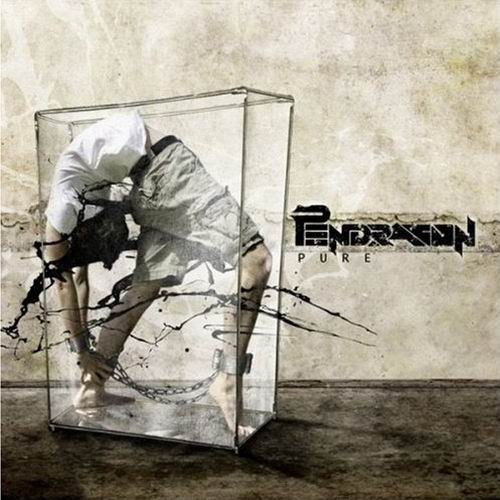 "With Pure we did something different, 'cause I quite like experimenting. We made the album and went straight out on tour with it. Of course a lot of people hadn't downloaded it so they bought it. Rather than tour six months later, well if you do that everyone's downloaded it. So this was definitely the way forward. It was the best business plan we had."
"With Pure we did something different, 'cause I quite like experimenting. We made the album and went straight out on tour with it. Of course a lot of people hadn't downloaded it so they bought it. Rather than tour six months later, well if you do that everyone's downloaded it. So this was definitely the way forward. It was the best business plan we had."
Barrett confirms that being a musician is his sole means to earn a living, which probably explains his animus toward downloaders. "Occasionally you have to be quite philosophical," he says. "I was able to buy a house in a nice part of England, which not all my peers have managed to do." Losing the house in a divorce settlement has given him an even more philosophical view toward material wealth. "I'm just happy and grateful to be able to make music," he says. "I'm still able to sell a decent number of albums, but I still have to work hard. Those who don't rely on music as their income turn out music that they don't really believe in. It's more of a hobby and less important. For instance, Roine Stolt (founder of Swedish group, Flower Kings) has to make it work so a lot of effort is put into it. Spock's Beard has to try hard. If they make a duffer, they're going to suffer. When you've got to do it yourself I think you've got a little bit more fight to it. You think, 'Well, I'm on my own here. I can't cry into my sleeve and blame other people for being let down.'"
 He admits, though, "You still got to keep finding new ways. We'll do a couple conventions — that really helped. But I'm really happy that at the end of that five-year plan it did work. But it's a hell of a lot of time-consuming stuff. Booking the tour bus, organizing the crew, rehearsing the material, booking the rehearsal rooms... there's a load of stuff to do. Promoting the gigs, organizing all the catering and all the riders and all the PA and lighting specs... it's a nightmare. And I got a bit burnt out."
He admits, though, "You still got to keep finding new ways. We'll do a couple conventions — that really helped. But I'm really happy that at the end of that five-year plan it did work. But it's a hell of a lot of time-consuming stuff. Booking the tour bus, organizing the crew, rehearsing the material, booking the rehearsal rooms... there's a load of stuff to do. Promoting the gigs, organizing all the catering and all the riders and all the PA and lighting specs... it's a nightmare. And I got a bit burnt out."
So now Nick Barrett gets to recharge a bit. "I just thought I'll have a rest for a bit and concentrate on writing music, on working on the next album. I haven't really got a plan for the next five years. I suppose we'll just carry on for a bit and see what happens."
He feels it's taken him longer than he would have expected to arrive where he is. "It’s like fate," he muses. "Things that are worth doing are never easy. But I'm musically happier than I've ever been. Music is more important to me than ever."
Filed under: Profiles
Related artist(s): Pendragon
More info
http://www.facebook.com/pages/Pendragon-band/112110622138694
http://www.artist-shop.com/toff
What's new
These are the most recent changes made to artists, releases, and articles.
- Release: Thierry Zaboitzeff - Artefacts
Updated 2026-02-27 00:16:46 - Review: Kevin Kastning - Codex I & Codex II
Published 2026-02-27 - Release: Zan Zone - The Rock Is Still Rollin'
Updated 2026-02-26 23:26:09 - Release: The Leemoo Gang - A Family Business
Updated 2026-02-26 23:07:29 - Release: Ciolkowska - Bomba Nastoyashchego
Updated 2026-02-26 13:08:55 - Review: Immensity Crumb - Chamber Music for Sleeping Giants
Published 2026-02-26 - Release: The Gatekeepers - Diary of a Teenage Prophet
Updated 2026-02-25 15:55:58 - Review: Mars Lasar - Grand Canyon
Published 2026-02-25 - Listen and discover: Mordecai Smyth will not break your back
Published 2026-02-25 - Release: Tashi Wada - What Is Not Strange?
Updated 2026-02-24 14:56:16 - Artist: Tashi Wada
Updated 2026-02-24 14:54:34 - Release: Greg Segal - Maintain!
Updated 2026-02-24 00:38:03 - Review: Il Segno del Comando - Sublimazione - Live
Published 2026-02-24 - Review: Nektar - Mission to Mars & Fortyfied
Published 2026-02-23 - Review: Jaime Rosas - Tres Piezas de Rock Progresivo
Published 2026-02-22 - Release: Kevin Kastning & Bruno Råberg - Across Tall Rain
Updated 2026-02-21 00:42:08 - Review: Gary Husband - Postcards from the Past
Published 2026-02-21 - Release: Daniel Crommie - Februa
Updated 2026-02-20 14:23:17
